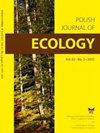Allelopathic Effects of Wood Small-Reed (Calamagrostis epigejos) on Germination and Growth of Selected Grassland Species
IF 0.7
4区 环境科学与生态学
Q4 ECOLOGY
引用次数: 5
Abstract
ABSTRACT The role of allelopathy in the displacement of given meadow species by wood small-reed (Calamagrostis epigejos) is not well recognized. The aim of this study was to evaluate and compare the influence of volatile and aqueous extracts from C. epigejos on initial recruitment of typical mesic meadow species (Daucus carota, Rumex acetosa, Festuca pratensis and Dactylis glomerata). The activity of allelochemicals contained within above-ground biomass, below-ground biomass and necromass of the donor plant was estimated. Using gas chromatography-mass spectrometry technique led to the identification of 19 compounds (alcohols, aldehydes, ketones and esters) in C. epigejos volatile extracts. Aliphatic alcohols were the main group of identified chemicals, including (Z)-3-hexen-1-ol acetate. The laboratory tests showed a significant inhibitory influence of volatile C. epigejos extracts on the growth of D. glomerata, D. carota and R. acetosa roots. The influence of aqueous C. epigejos extracts on selected meadow species was less evident. Only the seeds of D. glomerata and F. pratensis were found to be susceptible to water extracts of above-ground C. epigejos biomass. The seed germination was stimulated by the extracts at low concentrations but inhibited at higher concentrations. Among the tested plants only the growth of F. pratensis seedlings was inhibited by aqueous extracts obtained from all examined C. epigejos parts. In regarding to the other test species the effect of C. epigejos extracts was neutral or positive. The results suggest that C. epigejos has a allelopathic potential to suppress the growth of co-occurring grassland species.木小苇(Calamagrostis epiejos)对部分草原物种发芽和生长的化感作用
摘要化感作用在木小芦苇(Calamagrostis epiejos)取代特定草地物种中的作用尚未得到充分认识。本研究的目的是评估和比较表观C.epiejos的挥发性和水性提取物对典型mesic草甸物种(Daucus carota、Rumex acetosa、Festuca pratensis和Dactylis glomerata)初始招募的影响。估算了供体植物地上生物量、地下生物量和坏死体中所含化感物质的活性。利用气相色谱-质谱技术,鉴定了表观花挥发油中的19种化合物(醇类、醛类、酮类和酯类)。脂肪醇是已鉴定的主要化学物质,包括(Z)-3-己烯-1-醇乙酸酯。室内试验表明,表观草挥发性提取物对球墨豆根、角豆根和乙酰乙酸根的生长具有显著的抑制作用。表观C.epiejos水提取物对所选草地物种的影响不太明显。只有球墨藻和草地早熟禾的种子对地上C.epiejos生物量的水提取物敏感。低浓度提取物能刺激种子发芽,但高浓度提取物能抑制种子发芽。在测试的植物中,从所有检查的表观C.epiejos部分获得的水提取物仅抑制了草地镰刀菌幼苗的生长。关于其他测试物种,表观C.epiejos提取物的效果是中性或阳性的。结果表明,表观C.epiejos具有抑制共生草原物种生长的化感潜力。
本文章由计算机程序翻译,如有差异,请以英文原文为准。
求助全文
约1分钟内获得全文
求助全文
来源期刊

Polish Journal of Ecology
环境科学-生态学
CiteScore
1.10
自引率
0.00%
发文量
9
审稿时长
18-36 weeks
期刊介绍:
POLISH JOURNAL OF ECOLOGY (formerly Ekologia polska) publishes original scientific research papers dealing with all aspects of ecology: both fundamental and applied, physiological ecology, evolutionary ecology, ecology of population, community, ecosystem, landscape as well as global ecology. There is no bias regarding taxons, ecosystems or geographical regions.
 求助内容:
求助内容: 应助结果提醒方式:
应助结果提醒方式:


